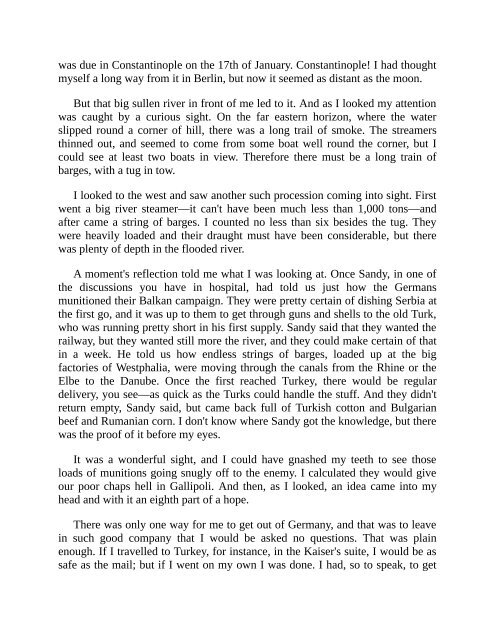Greenmantle - John Buchan
Greenmantle es la segunda de las cinco novelas de John Buchan con el personaje de Richard Hannay , publicado por primera vez en 1916 por Hodder & Stoughton , Londres . Es una de las dos novelas de Hannay ambientadas durante la Primera Guerra Mundial , la otra es el Sr. Standfast (1919); La primera y más conocida aventura de Hannay, The Thirty-Nine Steps (1915), se desarrolla en el período inmediatamente anterior a la guerra.
Greenmantle es la segunda de las cinco novelas de John Buchan con el personaje de Richard Hannay , publicado por primera vez en 1916 por Hodder & Stoughton , Londres . Es una de las dos novelas de Hannay ambientadas durante la Primera Guerra Mundial , la otra es el Sr. Standfast (1919); La primera y más conocida aventura de Hannay, The Thirty-Nine Steps (1915), se desarrolla en el período inmediatamente anterior a la guerra.
You also want an ePaper? Increase the reach of your titles
YUMPU automatically turns print PDFs into web optimized ePapers that Google loves.
was due in Constantinople on the 17th of January. Constantinople! I had thought<br />
myself a long way from it in Berlin, but now it seemed as distant as the moon.<br />
But that big sullen river in front of me led to it. And as I looked my attention<br />
was caught by a curious sight. On the far eastern horizon, where the water<br />
slipped round a corner of hill, there was a long trail of smoke. The streamers<br />
thinned out, and seemed to come from some boat well round the corner, but I<br />
could see at least two boats in view. Therefore there must be a long train of<br />
barges, with a tug in tow.<br />
I looked to the west and saw another such procession coming into sight. First<br />
went a big river steamer—it can't have been much less than 1,000 tons—and<br />
after came a string of barges. I counted no less than six besides the tug. They<br />
were heavily loaded and their draught must have been considerable, but there<br />
was plenty of depth in the flooded river.<br />
A moment's reflection told me what I was looking at. Once Sandy, in one of<br />
the discussions you have in hospital, had told us just how the Germans<br />
munitioned their Balkan campaign. They were pretty certain of dishing Serbia at<br />
the first go, and it was up to them to get through guns and shells to the old Turk,<br />
who was running pretty short in his first supply. Sandy said that they wanted the<br />
railway, but they wanted still more the river, and they could make certain of that<br />
in a week. He told us how endless strings of barges, loaded up at the big<br />
factories of Westphalia, were moving through the canals from the Rhine or the<br />
Elbe to the Danube. Once the first reached Turkey, there would be regular<br />
delivery, you see—as quick as the Turks could handle the stuff. And they didn't<br />
return empty, Sandy said, but came back full of Turkish cotton and Bulgarian<br />
beef and Rumanian corn. I don't know where Sandy got the knowledge, but there<br />
was the proof of it before my eyes.<br />
It was a wonderful sight, and I could have gnashed my teeth to see those<br />
loads of munitions going snugly off to the enemy. I calculated they would give<br />
our poor chaps hell in Gallipoli. And then, as I looked, an idea came into my<br />
head and with it an eighth part of a hope.<br />
There was only one way for me to get out of Germany, and that was to leave<br />
in such good company that I would be asked no questions. That was plain<br />
enough. If I travelled to Turkey, for instance, in the Kaiser's suite, I would be as<br />
safe as the mail; but if I went on my own I was done. I had, so to speak, to get














